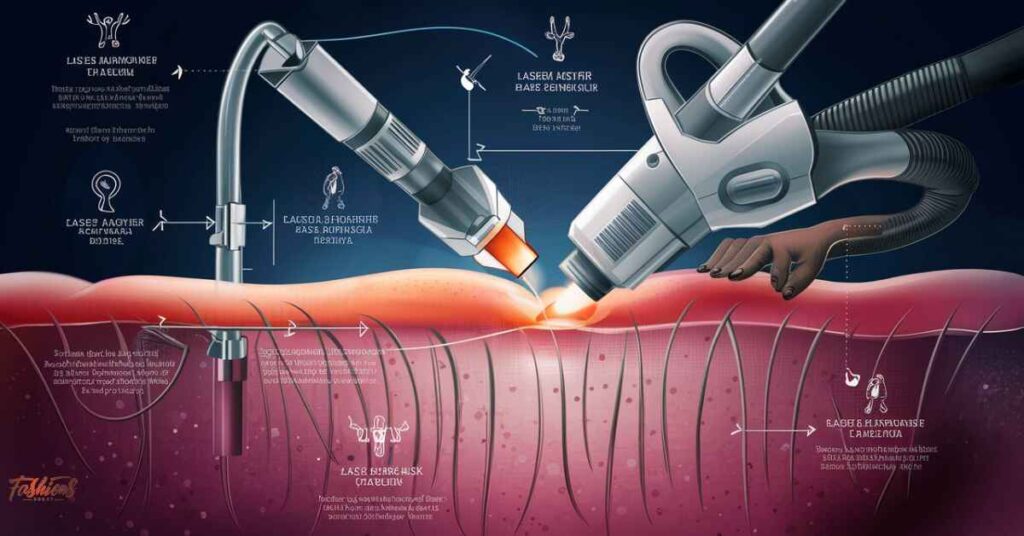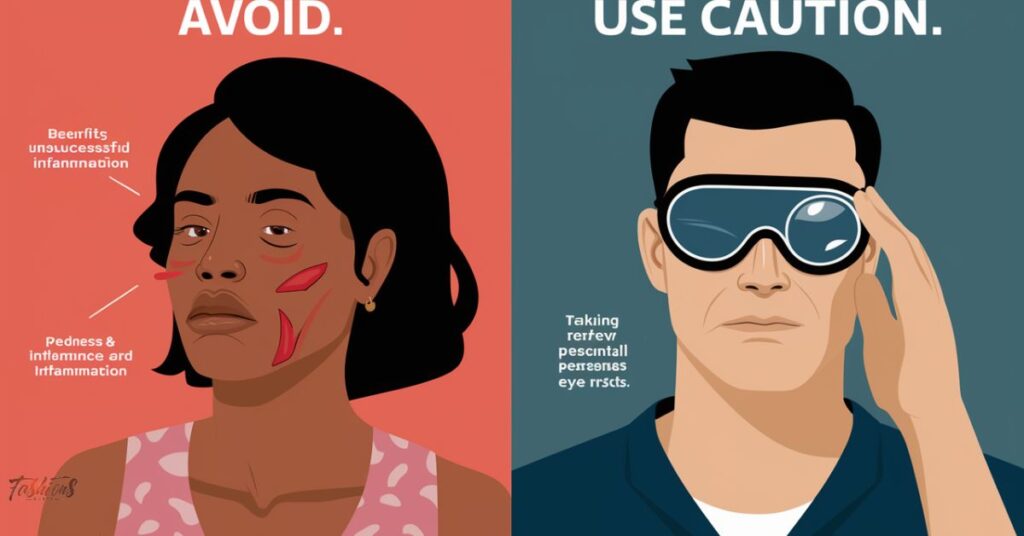I’ll never forget the knot of worry in my stomach before my first laser hair removal appointment. Despite being excited about the prospect of achieving smooth, hair-free skin, one nagging fear kept surfacing: “But what if it causes cancer?”
If you’ve felt similarly apprehensive, you’re not alone. The idea of using concentrated light – essentially “lasers“-to remove hair can sound scary. However, as I discovered, the concerns over laser hair removal potentially causing cancer stem largely from misconceptions.
In this article, we’ll separate fact from fiction. You’ll learn exactly how this cosmetic procedure works, analyze authoritative research findings, and get the real deal on cancer risk. It’s time to bust the myths wide open!
Understanding Laser Hair Removal: How It Works
At its core, laser hair removal utilizes concentrated beams of light energy. But rather than random, dangerous “radiation,” it relies on specific wavelengths tailored to target a hair follicle’s pigment.
Here’s the process in a nutshell:
- A laser emits particular light wavelengths absorbed by the hair’s pigment
- This light energy heats up the follicle, effectively damaging it
- The damaged hair follicle can no longer grow new hair strands
But here’s the crucial distinction: laser hair removal uses non-ionizing radiation sources. Unlike ionizing radiation (e.g. X-rays, gamma rays), this type completely lacks the force needed to dislodge electrons from atoms-which is what leads to cellular/DNA damage.
Put simply, laser hair removal light might slightly warm the skin’s surface. But it doesn’t penetrate deeply enough to wreak havoc on your cellular makeup like other, high-energy radiations can.
Why the Cancer Concerns?
So if laser hair removal doesn’t actually use dangerous “radiation,” why the persistent cancer worries? A large part boils down to one understandable misunderstanding:
Many people falsely assume ALL radiation sources carry major health risks.
After all, we’re routinely warned about limiting radiation exposure from X-rays, UV rays, and other ionizing forms. So from that perspective, anything involving “lasers” or “light radiation” can sound inherently risky.
But as explained above, the non-ionizing radiation utilized in laser hair removal procedures simply lacks the capability for DNA/cellular disruption that could contribute to cancer development.
The Research on Laser Hair Removal and Cancer Risk

Of course, we can’t just take laser hair removal’s safety at face value. Fortunately, numerous major health authorities have thoroughly researched and evaluated this issue. Their consensus provides reassuring facts:
“There is no evidence that laser hair removal causes cancer.” – (American Society for Dermatologic Surgery)
The ASDS report cites multiple large-scale studies finding zero increased cancer risk among individuals who have undergone laser hair removal treatments.
Similarly, the Skin Cancer Foundation confirms no known link between the procedure and skin cancer development. In fact, specific laser types are sometimes used to treat precancerous lesions!
Numerous other trusted health organizations like the American Academy of Dermatology, FDA, and NHS all arrive at the same science-backed conclusion:
When performed by trained professionals following proper protocols, laser hair removal is an extremely low-risk procedure in terms of cancer.
FDA Regulation and Approval
Speaking of protocols, laser hair removal devices must meet rigorous safety standards set by the U.S. Food and Drug Administration (FDA). The FDA classifies them as “pharmaceutical products” requiring premarket approval to demonstrate they are both safe and effective when used as intended.
Multiple laser hair removal systems have earned FDA approval after extensive review, provided facilities follow all outlined guidelines for operation, maintenance, user training, and more. This regulatory oversight exists specifically to minimize any potential hazards.
So in summary: approved, properly-used laser hair removal devices utilize non-ionizing radiation entirely incapable of triggering cancer development. Their designs and applications are vetted to be safe by the FDA itself. Any responsible med-spa or dermatologist’s office will adhere to every protocol.
Read this blog
Does Mounjaro Cause Hair Loss? Expert Review (2024)
Common Side Effects of Laser Hair Removal (But Not Cancer)

While the research overwhelmingly shows no link to cancer, laser hair removal can still sometimes cause mild, temporary side effects like:
- Skin redness and irritation: The skin surface may appear slightly inflamed, swollen, or rashy for a day or two following treatment. This results from the laser’s heat impacting surface skin cells during hair follicle targeting. Using a cold compress can provide relief.
- Pigment changes: Some patients experience darkening or lightening of treated skin areas that typically fades within several weeks. Those with fairer complexions tend towards darkening, while deeper skin tones sometimes lighten after laser exposure.
- Folliculitis: Hair follicles can occasionally become inflamed, causing small bumps that subside with medication.
While these effects can be a nuisance, they are not at all a sign of underlying cancer risk. Rather, they stem from the laser’s localized heat/light impact being a controlled “trauma” to targeted hair follicles.
More severe reactions like burns, blistering, or significant scarring should be quite rare when the procedure is done correctly under professional supervision. They indicate protocols were likely not properly followed.
Myths: Laser Hair Removal Causing Infertility or Other Dangers
Beyond the misguided cancer fear, a few other concerning laser hair removal myths tend to persist. For your peace of mind, let’s address and debunk them one-by-one:
Myth: Laser Hair Removal Can Cause Infertility/Reproductive Issues
Fact: This is absolutely not true. The low-level lasers stop at targeting surface hair follicles and cannot penetrate deeply enough into the body to impact reproductive organs in any way.
Myth: Laser Hair Removal Increases Risk of Internal Diseases
Fact: Again, no. Laser hair removal light does not enter the body’s internal systems and therefore can’t trigger or worsen conditions like cancer, thyroid disorders, autoimmune diseases, etc.
Myth: Laser Hair Removal Can Cause Full-Body Hair Loss
Fact: While laser treatments can very rarely trigger temporary hair shedding, the claim of complete, irreversible hair loss is unfounded. The lasers only disable actively-growing follicles in the targeted treatment area.
At the end of the day, these unsubstantiated claims reflect understandable fears over using novel technologies on our bodies. Hopefully busting these myths helps provide reassurance when the procedure is performed responsibly.
Who Should Avoid or Use Caution with Laser Hair Removal?
With that said, laser hair removal isn’t 100% risk-free for everyone. There are some cases where it may be inadvisable or require extra precautions:

Pregnant Women: Many med-spas and dermatologists will not perform laser treatments during pregnancy or for nursing mothers. This is simply due to lack of comprehensive studies on potential effects rather than proven risks.
Those Prone to Keloid Scarring: Individuals with a known tendency to develop excessive scar tissue after injuries may want to avoid or limit laser hair removal in visible areas.
Photosensitizing Medications: Certain prescriptions like antibiotics can increase light sensitivity and burning risk.
Sun Exposure & Skin Tones: Sun exposure shortly before or after treatment increases potential side effects. Those with fairer and darker skin tones may need adjustments to laser settings.
Untrained Providers: Perhaps the biggest caveat is only trusting experienced, certified laser technicians who follow all recommended protocols. Improper laser use increases the chances of burns, scarring, and adverse effects.
In the hands of qualified professionals, however, laser hair removal remains an overwhelmingly safe procedure for the vast majority of people. Simply be candid about your medical history, prepare properly for sessions, and follow post-care instructions.
Also read
Can Dandruff Cause Hair Loss? A Comprehensive Guide
Frequently asked questions
What is the danger of laser hair removal?
Laser hair removal poses minimal danger when performed by trained professionals using appropriate protocols.
Do people regret laser hair removal?
While some individuals may experience mild discomfort or temporary side effects, most do not regret laser hair removal. This is due to its effectiveness in long-term hair reduction.
What is an interesting fact about laser hair removal?
An interesting fact about laser hair removal is that it is one of the most commonly performed cosmetic procedures globally. Millions of successful treatments are conducted each year.
Is laser hair removal haram?
The permissibility of laser hair removal in Islam can vary depending on the specific interpretation and context. Some scholars consider it permissible for cosmetic purposes.
Can laser hair removal affect fertility?
Laser hair removal typically does not affect fertility. This is because the laser targets hair follicles on the skin’s surface without reaching reproductive organs or hormonal systems.
Is laser hair removal worth it?
Laser hair removal is considered worth the investment for many individuals seeking long-term hair reduction and smoother skin. This is due to its effectiveness and convenience.
Conclusion
Laser hair removal does not cause cancer or pose major health risks for several reasons. First, it employs low-energy, non-ionizing radiation that cannot harm DNA or cells in a way that leads to cancerous mutations. Major health authorities like the American Society for Dermatologic Surgery, Skin Cancer Foundation, American Academy of Dermatology, and FDA have all confirmed this lack of evidence linking laser hair removal to increased cancer rates.
Additionally, common side effects such as temporary redness, swelling, or pigment changes do not indicate any cancer risk or internal damage. Severe burns or scarring are exceptionally rare when proper protocols are followed. Claims about laser hair removal causing infertility, hair loss, or internal conditions are unfounded, as the laser light cannot penetrate deep enough to affect internal organs.
Overall, fears about laser hair removal’s safety primarily stem from misconceptions about radiation, rather than scientific evidence. With proper precautions and guidance from certified professionals, laser hair removal offers a safe and effective solution for achieving hair-free skin without cancer risks or major health issues.







